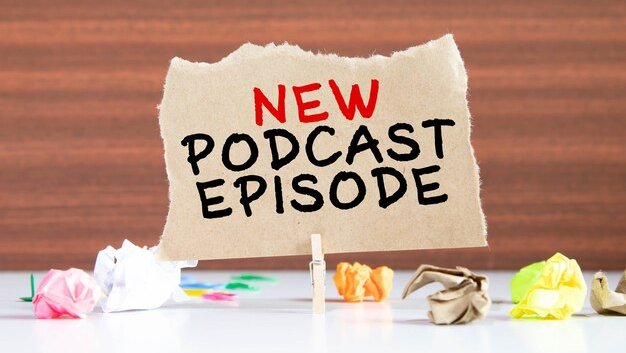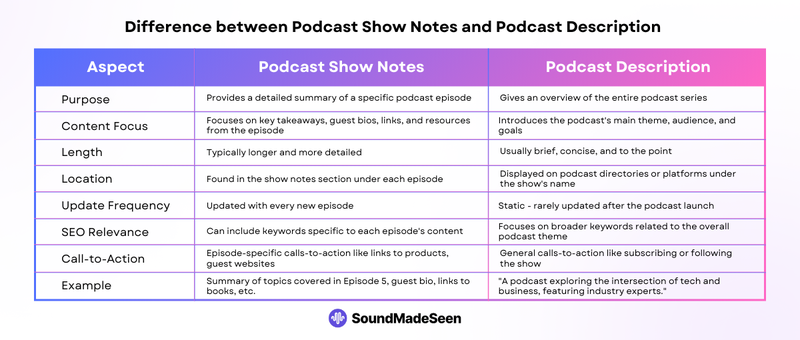ブログ
How to Write Great Podcast Show Notes (Plus Free Template)

投稿日:2024/11/3 作成者:Babalola Alabi
PodcastingPodcast show notes add significant value to your podcast and boost its visibility. If done correctly, they can attract new listeners, improve search engine rankings, and create a richer experience for your audience by giving them easy access to relevant information.
This content will discuss how to create the best podcast show notes for your episode. Plus, you have access to a free, professionally designed template that you can use every time, empowering you to create engaging show notes. Keep reading as we dive in.
What are Podcast Show Notes?
Podcast show notes are written descriptions of your podcast episode that give listeners information about what happened in the episode. Usually, they contain an episode summary, key takeaways, important keywords, timestamps, the episode transcript, call-to-actions, etc. Depending on the information added, show notes vary in length, information shared, links added, etc.

Features of Podcast Show Notes
A standard podcast show note has the following features:
- Episode title: Catchy and informative words summarizing the podcast episode.
- Episode Description/Summary: A brief overview of the episode that explains the main discussion and key takeaways.
- Timestamps: Time markers that indicate when specific topics or segments start during the episode.
- Guest information: Guest’s name, bio, and links to their websites, social media profiles, or other relevant resources.
- Links and Resources: A list of websites, books, articles, and other resources mentioned in the episode.
- Call-To-Action: A section encouraging listeners to take further action, like subscribing to the podcast.
- Episode Transcript (Optional): A full transcript of the episode.
- Social Media and Contact Information: This section includes links to the podcast’s social media profiles, website, and contact information.
- Sponsor or Affiliate Information: If the episode is sponsored, include details about the sponsor and any promotional codes or offers mentioned during the episode.
Podcast Show Note vs Podcast Description: What’s the Difference?
Unlike podcast show notes, podcast descriptions are what you see next to a podcast logo or artwork when you search or open a podcast. They are the summarised “about us” content that talks about the podcast, what it’s about, the host, what to expect from the show, and other things the podcaster wants you to know about it.
Podcast show notes, on the other hand, are written for each episode. The content could vary in length and include additional information.

Why Podcast Show Notes are Important?
Some of the reasons podcast show notes are important include:
1. Improves Listener’s Experience
Show notes summarize your podcast episode and help listeners follow the content easily. They also provide a quick reference for key takeaways, resources, or links without re-listening the entire episode, showing that you value your listeners' time and experience.
2. Boosts SEO
Well-written show notes can improve your podcast's search engine visibility. Including relevant keywords, links, and phrases in the notes can help the podcast rank higher on Google and other search engines. This helps attract more listeners searching for related topics.
3. Easy Access to Resources
Sometimes, you discuss a book, blog post, course, guest profile, or other important things in your podcast episode. To make accessing the resources and other information easy, podcast show notes are the perfect go-to tool.
4. Great Marketing Tool
Podcast show notes can be repurposed and shared on social media, email newsletters, and websites. This acts as a promotional tool to attract more listeners and entice potential listeners to tune in.
How to Create the Best Podcast Show Notes
Now that you know the importance of a podcast show note and what to include in it, let’s discuss how to create the best ones for your podcast episode.
1. Start with keyword research and optimize for SEO
One of the importance of show notes is its capability to position your podcast for ranking and organic traffic through SEO. You can achieve that by finding and adding relevant keywords to your content, writing SEO-optimized content, and appropriately organizing your content structure. Write SEO-friendly titles, add title and heading tags, and keep the show notes simple and easy to understand.
2. Add a catchy title and a hook
Your episode title should grab your audience’s attention, and the hook should be short. Whatever you add as your hook or title must give listeners an idea of the discussion and highlight the most exciting part of the content.
3. Write a compelling episode summary
Your episode summary should be concise and engaging. Focus on what’s intriguing in the podcast that the listener will never want to miss. As much as you want to share the fascinating part of the podcast episode, you should be mindful of what you share so that you don’t spoil everything. Don’t give too much away.
4. Include timestamps
Timestamps break down your content into key moments that happened. This makes it easy for listeners to jump to specific sections, especially if they’re short of time or looking for a particular part. An example is:
00:02: Introduction
05:35: Guest discussion on Yoga and exercise tips
15:20: Q&A session
Remember that timestamps should be added for just the significant segment of the podcast episode.
5. Add a short but interesting information about your guest
If you have a guest on the episode, add their bio and other information like website and social media handles. Include credentials, expertise, or clickable links to their resources or projects that add credibility and encourage the listeners to follow the guest or check out their work.
6. Add links to all resources and recommendations discussed in the episode.
If you or your guest discussed some resources during the episode, add them to your show notes. This will make it easier for your audience to access the resources and make your content more valuable by providing them with extra information. Affiliate links can also be added.
7. Add a call-to-action
A call-to-action (CTA) encourages listeners to subscribe, leave a review, follow on social media, or join a mailing list, depending on what you want them to do. Create a separate section for your CTA—usually at the end of the podcast show note—to make them perform specific actions.
Common CTAs in podcast show notes might include:
- Asking listeners to subscribe to the podcast.
- Encouraging them to leave a review or rating.
- Suggesting they follow on social media.
- Inviting them to join a newsletter or community.
- Directing them to check out related episodes or content.
Also, if you have a Patreon link or some other monetization site, the CTA section is perfect for adding it.
8. Include your podcast transcript
Consider providing a transcript of the episode to increase accessibility. Podcast transcripts widen your audience as some listeners prefer reading while listening while some might just read alone due to preferences or hearing impairment.
Podcasts Show Note Template
Now that you know how to create a podcast show note, starting with a template could be a great idea. All you have to do is fill in the information and you're set.
To use SoundMadeSeen’s podcast show note template, go to our Free Podcast Show Notes page, fill in your name and email address, then download the template in PDF format.

Create Quality Podcast Show Notes Easily with SoundMadeSeen
Writing podcast show notes could be tedious, even though they can boost your performance. However, tools like SoundMadeSeen can help you generate your show notes easily within a few minutes. All you have to do is upload your podcast or audio file, allow SoundMadeSeen to analyse your podcast, and create the show notes.
You can then follow our best practices to edit your content. Check out our guide to promote, grow, and monetize your podcast.



